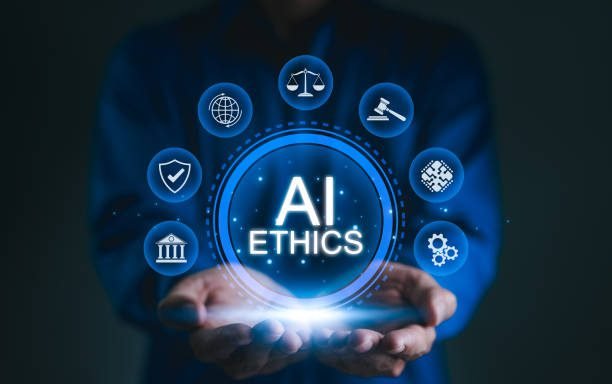Let’s be real—AI isn’t just “emerging tech” anymore. It’s here. It’s shaping job interviews, bank loans, even parole decisions. And here’s the wild part: sometimes, the algorithms behind these systems don’t fully understand what they’re doing. They’re just trained to guess based on mountains of historical data—data that hasn’t always been fair. Enter AI ethics.
This is where humanity and technology meet head-on. And in 2025, we urgently need people who can steer the conversation.

If you’ve ever asked, “Is this right?” or “What could go wrong?”—you may already be closer to a career in AI ethics than you think.
We’ve seen:
- Lawyers become AI fairness auditors
- Teachers evolve into responsible tech educators
- UX designers take the lead on ethical product design
So how do you make the leap into AI ethics without starting from scratch?
Let’s map it out.
What Is AI Ethics, Really?
Forget the fluff. AI ethics isn’t just about mission statements or aspirational posters.
It’s about putting real guardrails on innovation—and helping teams ask the hard questions:
- Who might this model unintentionally harm?
- What data are we training it on?
- Who’s not in the room while these decisions are being made?
At its core, AI ethics combines policy, philosophy, technical awareness, and people skills. It’s less about knowing everything—and more about knowing how to ask the right questions and hold systems accountable.
Sound like your thing? Let’s go deeper.
Read more about tech blogs.
You Don’t Need a CS Degree to Make a Difference
Tech can feel like a gated community. But AI ethics is one of the few tech sectors actively welcoming non-technical voices.
If you’re coming from:
- Law or compliance – You speak regulation and risk.
- Social sciences – You understand systems, power, and people.
- HR or DEI – You’ve seen bias in hiring up close.
- Education/community work – You know how policy affects real lives.
These aren’t “soft” skills. They’re exactly what most AI teams are missing.
Build a Bridge from What You Know
Pivoting your career doesn’t mean hitting reset. It means building on your existing foundation.
Ask yourself:
- Have I worked on projects involving fairness, transparency, or community impact?
- considered unintended consequences in any process I’ve managed?
- Have I advocated for underrepresented groups or challenged unfair systems?
If you answered “yes” to even one, you’re already standing on solid ground.
Learn Enough Tech to Be Dangerous (in a Good Way)
You don’t need to become a data scientist. But you do need to understand the basics.
Here’s what to focus on:
- How AI models are trained and evaluated
- Why biased data causes real-world harm
- What “black box” models are and why they’re risky
- The lifecycle of an AI system—from design to deployment
Beginner-friendly resources:
- AI Ethics MOOC – University of Helsinki
- MIT Short Program – Ethics and the Law of AI
Case Study: From Policy to Product Ethics
Last year, we worked with a healthcare tech client struggling with bias in predictive models. They had no internal ethics team.
One of their senior policy advisors—whose main job had been writing HR manuals—stepped up. She didn’t code, but she knew how to write policy, lead workshops, and read between the lines of impact reports.
By the end of the quarter, she was consulting directly with engineers to identify bias and adjust decision thresholds.
That’s what a successful pivot looks like.
Join the (Global, Loud, Messy) Conversation
AI ethics isn’t a closed club. It’s a growing, messy, passionate global movement. And we need more voices.
Get involved:
- Follow thought leaders like Timnit Gebru, Abeba Birhane, and Rumman Chowdhury on LinkedIn and X.
- Explore forums like Partnership on AI or attend the FAccT Conference.
- Join webinars from organizations like Mozilla Foundation or AI Now Institute.
- Read case studies from real-world deployments (we share ours at Einfratech).
We Help You Pivot with Purpose
We’re not just watching from the sidelines.
we:
- Mentor professionals transitioning into ethical tech roles
- Run internal “bias audits” for AI systems used in hiring, lending, and beyond
- Train mixed teams—policy pros + engineers—to collaborate effectively
- Connect experienced hires with roles that fit their ethics-first mindset
We’ve helped dozens of professionals not just pivot, but thrive in AI ethics roles that match their values.
Final Thoughts: This Isn’t About Chasing a Trend
This isn’t hype. It’s responsibility.
If you’ve ever looked at a system and thought, “This doesn’t seem fair,”—you’re already halfway there.
If you’re ready to turn that gut instinct into a real, high-impact career… we’re ready to walk the path with you.
Because responsible AI isn’t optional anymore. It’s essential.